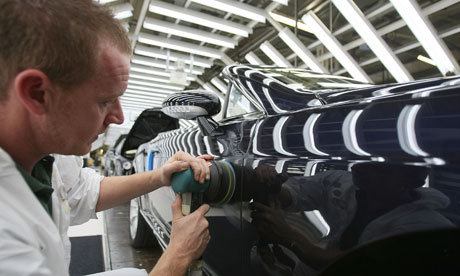Source: The Guardian
The story is that innovation rapidly reduced the need for factory workers and other skilled labor. The data just doesn't support it

Unionization has shrunk in the US from over 20% in the 1970s to less than 7% today.
(Image by Guardian) Details DMCA
A widely held view in elite circles is that the rapid rise in inequality in the United States over the last three decades is an unfortunate side-effect of technological progress. In this story, technology has had the effect of eliminating tens of millions of middle wage jobs for factory workers, bookkeepers, and similar occupations.
These were jobs where people with limited education used to be able to raise a family with a middle class standard of living. However computers, robots and other technological innovations are rapidly reducing the need for such work. As a result, the remaining jobs in these sectors are likely to pay less and many people who would have otherwise worked at middle wage jobs must instead crowd into the lower paying sectors of the labor market.
This story is comforting to elites, because it means that inequality is something that happened, not something they did. They won out because they had the skills and intelligence to succeed in a dynamic economy, whereas the huge mass of workers that are falling behind did not. In this story, the best we can do for those left behind is empathy and education. We can increase opportunities to upgrade their skills in the hope that more of them may be able to join the winners.
That's a nice story, but the evidence doesn't support it. My colleagues Larry Mishel, John Schmitt, and Heidi Sheirholz, just published a paper showing that the pattern of job growth in the data doesn't fit this picture at all. This paper touches on a wide variety of issues related to technology and wage inequality, but first and foremost, it shows that the story of the hollowing out of the middle does not fit the data for the 2000s at all.
Since 2000, the increase in employment has occurred almost entirely in low-wage occupations. There has been a decline in relative employment for both workers in middle wage and high wage occupations. If this "occupational shift story" explained trends in wages we should expect to see sharply rising wages for retail clerks, custodians and other workers employed in low-paying occupations.
Of course, we see the opposite. Workers in these occupations continued to lose ground in the 2000s as they did in the prior two decades. Their wages barely kept pace with inflation over the last three decades.
The paper makes an impressive case that technology is not the main explanation for the rise in inequality that we have been seeing. In fact, even MIT economics professor David Autor, the leading proponent of the occupational shift story concedes this point. He was quoted in a New York Times column saying of the view that technology explains inequality:
"It can suck all the air out of the conversation ... All economists should be pushing back against this simplistic view."
Given the evidence compiled by Mishel et al, it would be difficult to maintain that technology has been the main culprit in the upward redistribution of income that we have seen.
It is not difficult to identify other potential culprits -- trade would certainly rank high on the list. A trade policy that quite deliberately puts factory workers in direct competition with low-paid workers in the developing world, while protecting doctors and other highly paid professionals, would be expected to redistribute income from the former to the latter.
The weakening of unions is likely also an important factor. The private sector unionization rate in the United States has shrunk from over 20% in the 1970s to less than 7% at present. In the same vein, the deregulation of major industries like airlines, telecommunications, and trucking has been another factor putting downward pressure on wages. The higher unemployment rates we have seen, not just in the last five years but in the last 35 years, compared with the early post-war decades, has also weakened the bargaining power of workers at the middle and bottom of the pay ladder.
(Note: You can view every article as one long page if you sign up as an Advocate Member, or higher).





